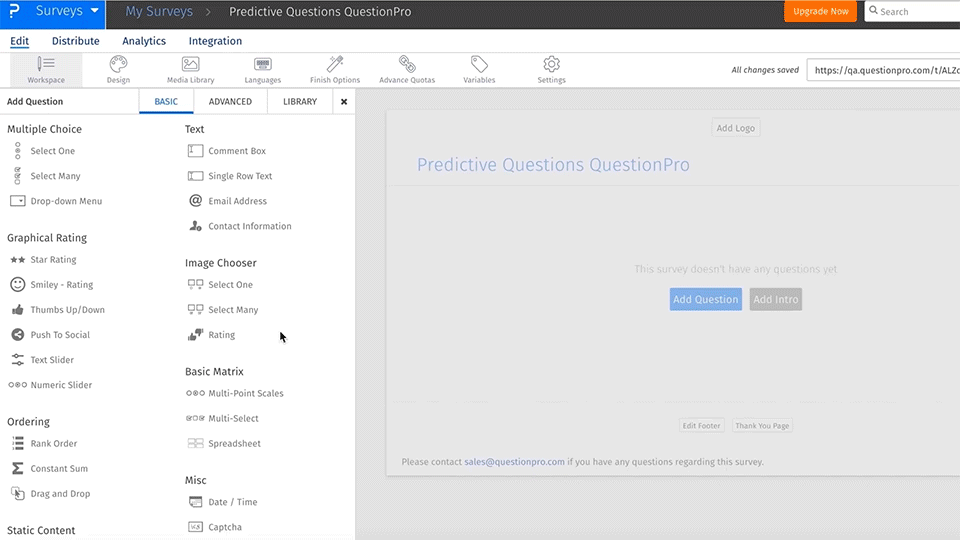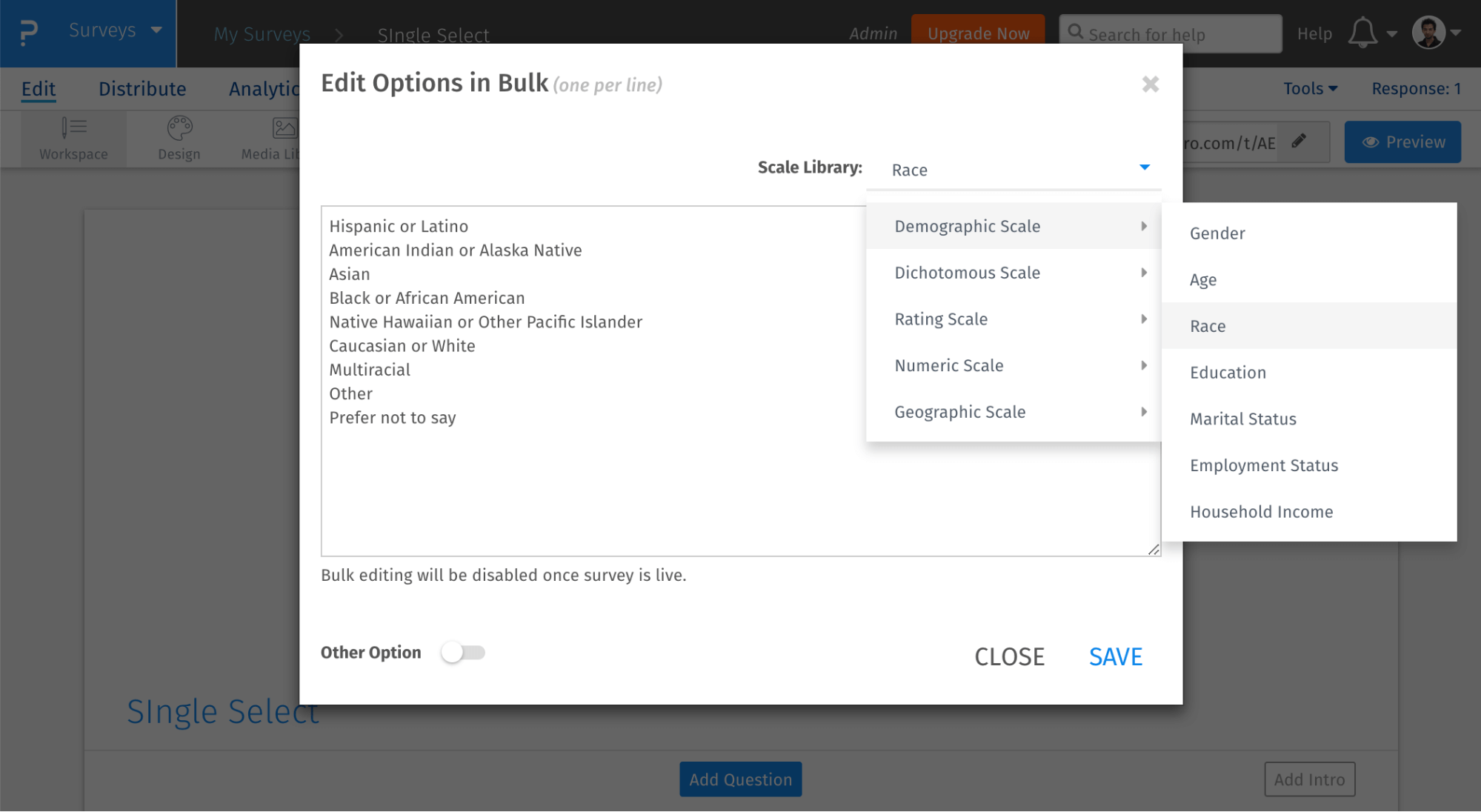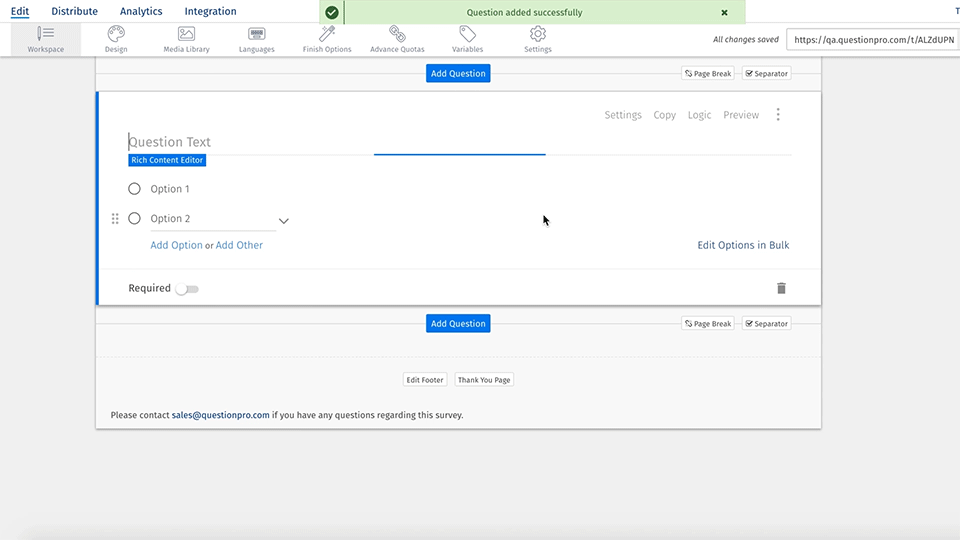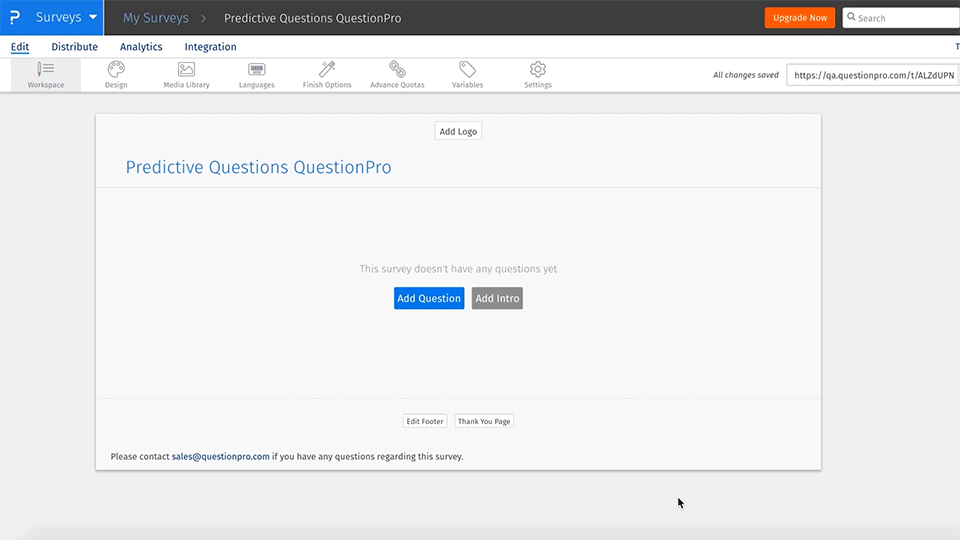What are predictive research questions?
Predictive research questions are defined as survey questions
that automatically predict the best possible response options based on the text of the question. Unique to QuestionPro survey software, predictive questions are made possible through AI-powered machine learning capabilities. Predictive questions are particularly popular because of their ease of use, time, and cost-saving properties.
For example, if you would like to collect the gender or sex of the respondent, on asking just gender as the question, pre-defined answer responses populate automatically. Another example of predictive survey questions is demographic information
questions such as age, race or ethnicity, occupation, etc. These questions aid in saving cost and time since the users take lesser time during the design phase.
Predictive questions can be widely used in the survey design
phase to reduce the time taken to develop a survey or questionnaire
with the help of AI-powered questions and answers. These questions also help reduce the effort taken by survey software users when coming up with responses that best define the research
objective. Predictive questions are most widely used in quantitative research
studies.
How do predictive research questions work?
The use of predictive research questions is one of the most vital cogs towards developing a standardized and robust survey. They use a very powerful artificial intelligence engine that scours for similarly worded questions and displays standardized options in surveys, ultimately aiding the data collection
process.
Predictive questions work in the following manner:
- Survey answer mapping: The QuestionPro survey platform uses a powerful artificial intelligence and predictive analytics engine to display answer options in a survey based on the question text. These answer options are automatically displayed on the basis of the question text of previous multiple surveys and the survey orientation. For example, questions related to the age of the respondent have standardized response options that can be edited on the survey objective of the researcher conducting the market research
study.
- Smart synonym identifiers: Predictive research questions in a survey use an analytical engine to display standard responses based on the type of the questions and the words used in them. For example, questions such as 'What is your age?', 'Age', 'How old are you?', etc. display similar answer options by using a smart synonymous terminology and sentence identifier.
- Multi-language support: The predictive questions engine in an online survey tool allows for standardized survey responses across a multilingual survey. Also, the answer options in previous surveys are pre-populated in each existing question in the survey. For example, if a survey is administered in 3 languages, the answer options are of the same nomenclature.
- Standardized responses: Survey data analysis
provides powerful and actionable insights if the survey is standardized. Predictive questions allow to use the same order in similar question types, which help provide relevant insights, and it also makes responding to the survey, simplified, which in turn increases the survey response rate
. For example, if the order of answers in a satisfaction type question is from 'Very dissatisfied to very satisfied', it increases the validity of the survey.
Examples of predictive survey questions
As seen above, there are multiple-uses of predictive questions and responses. Using these question types
can expedite the survey creation and survey distribution
process. Some examples of using predictive survey questions are:
 Demographic predictive questions
Demographic predictive questions
- Age
- Gender
- Ethnicity
- Education
- Marital Status
- Employment Status
- Total Household Income
Dichotomous predictive questions
- Yes/No
- True/False
- Agree/Disagree
- Fair/Unfair
Rating scale predictive questions
- Strongly Agree to Strongly Disagree
- Very Likely to Very Unlikely
- Very Unsatisfied to Very Satisfied
- Not Familiar to Very Familiar
- Not at all Important to Very Important
- Not at all Helpful to Very Helpful
- Poor to Excellent
- Never to Always
- Much Worse to Much Better
- Uncomfortable to Comfortable
- Uninterested to Interested
- Never to Daily
Numeric scale predictive questions
- 1 through 5
- 1 through 7
- 1 through 10
- 0 through 10
Geographic predictive questions
- Regions
- Countries
- Provinces
- States
- Cities
All of the above examples can be effectively used in the QuestionPro, online survey tool with a smart AI engine that allows the use of predictive questions.
Examples of predictive questions in QuestionPro
You can use predictive questions with multiple, single-select questions, including dichotomous questions, numeric scale questions, and rating scale questions. An example of using the QuestionPro online survey platform for numeric scale predictive survey questions is:

Another example of a predictive scale question is:

Predictive survey questions also work with matrix-style question types. While using predictive questions with the QuestionPro online survey platform, you can reverse the order of options, discard the options or manually edit the options to include/delete certain answer options for both single-select as well as matrix-style question types. For example:

The QuestionPro predictive questions AI engine is built by evaluating answer options of over 10 million surveys. This engine applies the core principles of machine learning, which will track which answer combination gets discarded and stop showing/using that prediction combination. On the other hand, it will also constantly 'learn' which answer options are being used for which question types and start displaying those updated options too when a new question is added in a survey.
Uses of predictive questions in research
Predictive questions will make the life of a researcher easy as well as reduce the time to create smart surveys and distribute them. Some of the significant uses of predictive questions are:
- Expedited go-to-market strategy: Using predictive questions in the QuestionPro online survey platform helps the researcher not just create the survey faster but also reduce the research required to decide on the answer options in the survey. Since the answer options in these questions 'learn' from over 10 million surveys, the responses are well-suited to collect standardized quantitative data
and cater to a wide range of research objectives. All of this aids in a much faster process to create and deploy a survey to collect market trends.
- Curation of rules: Basic rules for predictive survey questions are curated based on millions of data points from over 10 million surveys. These rules help to create standardized responses for question types that increase the relevance of the survey and data collection.
- Industry and domain-specific surveys: If a researcher would like to conduct a customer satisfaction survey
for a specific industry, it is beneficial to use an online survey tool that allows for domain-specific survey answer option customization. For example, if in hospitality surveys
, using 'dissatisfied' is more widely used than 'unsatisfied', the tool applies deep logic and machine learning to display such answer options.
Advantages of predictive questions
There are multiple advantages of predictive survey questions. Some of the most important advantages are:
- Reduced time & effort: One of the major advantages of using predictive questions in a survey, is the reduced time and effort by the researcher to conceptualize and enlist answer options in the survey design phase. This allows us to focus on the actual framing of the questions to collect in-depth survey responses.
- Smarter use of resources: Due to the reduced effort in collecting quantitative data
by using predictive survey questions, researchers can then focus their efforts on a market research study in collecting qualitative data
.
- Standardized reporting: The use of predictive questions aids towards enhanced reporting and creating smart insights since the answer options in the survey follow the same order and are standardized.
How to use predictive survey questions in QuestionPro?
Learn how to set up and ask these questions using our help file on predictive answer options.
 Survey software
Easy to use and accessible for everyone. Design, send and analyze online surveys.
Survey software
Easy to use and accessible for everyone. Design, send and analyze online surveys.
 Research Suite
A suite of enterprise-grade research tools for market research professionals.
Research Suite
A suite of enterprise-grade research tools for market research professionals.
 CX
Experiences change the world. Deliver the best with our CX management software.
CX
Experiences change the world. Deliver the best with our CX management software.
 Workforce
Create the best employee experience and act on real-time data from end to end.
Workforce
Create the best employee experience and act on real-time data from end to end.












